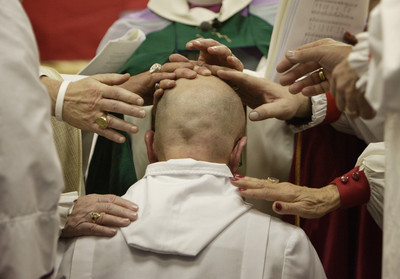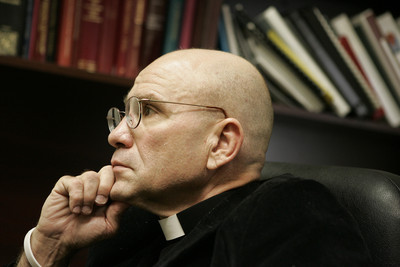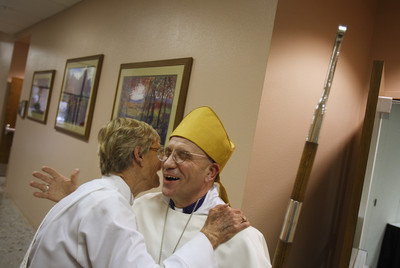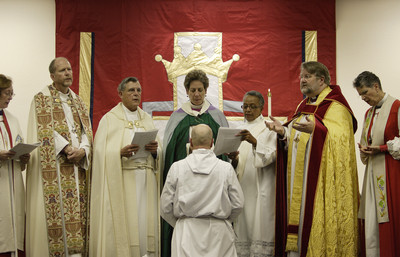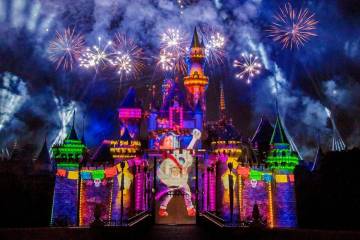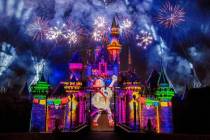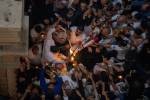STEPS OF FAITH
If he wanted to, Dan Edwards could carry on a pretty spirited interfaith dialogue just by talking to himself.
Consider his spiritual resume: Born and raised a Baptist. Attended a Presbyterian church during high school, and atheist, or at least agnostic, during the latter part of college. Buddhist during much of his career as an attorney working on behalf of minorities and the disenfranchised. And, for the past few decades, an Episcopalian and, even, an Episcopal priest.
It's not a typical resume for an ordained Episcopal clergyman. But, for Edwards, all were necessary steps that prepared him for his latest calling: bishop of the Episcopal Diocese of Nevada.
Edwards, 57, was consecrated as bishop Saturday during a liturgy at the Henderson Convention Center. He now serves as spiritual leader of about 6,000 Episcopalians throughout Nevada and in Bullhead City, Ariz.
He is intellectual enough to outline the varying approaches of Eastern and Western religious thought toward social activism, articulate enough to liken his eclectic faith journey to having "hopped on several spiritual lily pads over the course of my life," and witty enough to employ the theme from "The Good, the Bad and the Ugly" as his cell phone ring tone ("I've been trying to figure out whether it has some Trinity theme in it ... ").
Edwards was born in Texas, in a small town outside Texarkana, to what he describes as a "struggling, working class" family. He was raised a Baptist, and was a very good Baptist at that.
"I was religious as a kid," he says, smiling. "I probably took my parents to church more than they took me to church, even as a child."
Yet -- and, maybe, in a sign of things to come -- the young Edwards even then showed ecumenical leanings.
"One of the things that was confusing to me in my childhood spirituality as a little Baptist was that I always felt these urges to bless things and to forgive sins," Edwards says, laughing. "That's sort of more Catholic piety, which really made no sense in my religious context."
Edwards entertained -- albeit briefly -- childhood notions of someday becoming a clergyman. Instead, after graduating high school, he enrolled in the University of Texas at Austin as an undergraduate, following that up by attending the university's law school.
As early as middle school, "I was interested in law because I was impressed by the courage it takes to be a lawyer representing unpopular people and unpopular causes," Edwards says. "I was struck by the importance of keeping society open and inclusive, and I believed that lawyers played an important role in protecting that openness and inclusivity."
After law school, Edwards spent 12 years practicing law in Colorado and Idaho, working on behalf of migrant farm workers and American Indians. But, by then, his spiritual life had downshifted.
"Sometimes, you hear people who were beaten up or burned by their fundamentalist upbringing," he says. "I was not beaten up or burned, but I did become bored with it."
In high school, Edwards had joined a Presbyterian church because "it was a church where open-minded inquiry was practiced." In college, he became interested in "a more philosophical kind of religion which, within a few years, had developed into a religion of social activism."
But, Edwards continues, "the religion part of it came to seem superfluous. So the religion dropped away and my mind really became about social action and advocacy. And that was essentially an atheist period or, at least, an agnostic-leaning-toward-atheistic period."
However, during law school, Edwards began meditating, "simply for the purpose of stress management. But in the course of meditation, I discovered something much deeper and wider than stress management."
"That was an experience of what I would now call 'God' and I didn't have much of a word for it then," he says. "But that sent me off on a path of searching Eastern religions."
During the early years of his law practice, Edwards was a practicing Buddhist. But, he says, "there came a point when that was no longer adequate for me."
Christianity again called, in part because the message of Jesus meshes so well with Edwards' own interest in social justice and advocacy on behalf of the poor and suffering. In addition, Edwards says his law practice "brought me into encounters with depths of evil I had not experienced before," including the case of an alleged contract killing that took place amid "a larger network of deceit and malevolence (that) was pretty discouraging."
"It was a very dark chapter," Edwards recalls, "and I was looking for a story big enough to have such a dark chapter in it and still come out with a good ending. And Christianity offered me that."
It was then that Edwards "kind of came to the Episcopal church without believing in it. But I decided I would do it as an experiment."
He attended worship regularly. He committed prayers from the Anglican Book of Common Prayer to memory, and recited the prayers throughout the day, saying them "whether I believed them or not."
"And, sometimes, it was painful to say the prayers," Edwards says. "But, as uncomfortable as it was, I kept feeling, sensing, intuiting that there was something to it."
And, little by little, Edwards felt something changing.
"We have a saying in the church: Praying shapes believing," he says. "We don't figure it all out, then pray out of what we have figured out. We pray, and prayer opens the heart and opens the mind. It shifts things in very deep ways inside us."
A key moment came when Edwards visited a man in prison. "He had a rap sheet five pages long: attempted murder, grand larceny, child molesting," he says.
Edwards had been reciting the Jesus Prayer (one version goes: "Lord Jesus, son of the living God, have mercy on me."), and, he says, "you practice it until it becomes kind of a background noise in your head.
"I was visiting this fellow and he came in -- a slim, dark man, a beard. I didn't have much Spanish and he didn't have any English, and we were struggling to communicate. During one silence, I looked at him and noticed this prayer in my head. And I really had this experience: I really felt the presence of Christ in this five-page felon. And that was profound. I wasn't the same after that."
Edwards began participating more fully in the Episcopal church he attended. He was confirmed in the church. "I found myself more and more alive and feeling more and more like myself than I ever did before," he says.
At 35, Edwards began to consider seriously seeking ordination. In 1987, after wrapping up loose ends from his law practice, Edwards entered seminary. After ordination, he served as curate at Christ Church in Macon, Ga., for four years, then for 13 years at St. Francis Episcopal Church in Macon. In October, Nevada Episcopalians chose him to succeed former Bishop Katharine Jefferts Schori, who now is presiding bishop of the United States Episcopal Church.
Edwards is as surprised as anybody that his ministerial journey has led him to become a bishop. In fact, he jokes, "my seminary classmates are as amazed as I am to see me here.
"There is a normal path to becoming bishop, and I have not followed it. I left being assistant at a fairly large, well-established church in Macon to go to a very small and struggling church in Macon -- not the sort of place where you look for bishops. A wonderful, delightful place, but not a bishop farm team of the church."
He threw his hat in the ring only after a fellow priest who previously had served here suggested at a pre-Lenten retreat in Atlanta that Edwards might be a good fit with the Nevada diocese. Edwards was skeptical, but checked out the diocesan Web site anyway.
"I fell in love with (the diocese)," he says. "I saw the people on the Web site and I just thought, 'These are people I'd like to know better and have for friends.' "
Edwards looked at the photos of the desert here and remembered that "all of my best encounters with God have been in the desert." He read about the kinds of ministry the diocese does -- heavy on social justice -- and the profile of what Nevadans wanted in their new bishop.
And, he says, "I just thought, 'Gosh, that doesn't sound like what I normally think of in a bishop. I don't know that it sounds like me, but it sounds more like me than it does my stereotype of a bishop."
Deacon Sandy Oetjen of All Saints Episcopal Church in Las Vegas, a member of the diocesan search committee, says Edwards brings "a broad range of experience" to the diocese. And, because of his work with American Indians and migrants in Colorado and Idaho, he also "has some familiarity with the kind of Western way of approaching things."
"We're a very different kind of diocese, and that was important to us: That somebody would recognize the differences between us and one of these very large dioceses."
And, Oetjen says, Edwards and his wife, Linda Holdeman Edwards -- an attorney and a law professor at Mercer College in Macon, she and Edwards met while working in a legal aid office in Colorado -- brought "absolute enthusiasm from the start."
That's certainly true. Two days before his consecration, Edwards already seemed eager to dive into his new calling, explore his new home and meet some new friends, which should come easily to him.
"I'm having fun," he says. "I'm having a tremendous time.
"I have just delighted in calling people I've known over the years and just describing the wonderful array of characters I'm meeting out here. Interesting people. Colorful people. Delightful people. Warm people. Friendly people. Ornery people. Cantankerous people. Eccentric people. All delightful in their own ways."
"There are very few -- very, very few -- dioceses where I could conceivably function as a bishop," Edwards says, smiling. "This is not only one of them. This is the best of them."
Contact reporter John Przybys at jprzybys@reviewjournal.com or (702) 383-0280.



